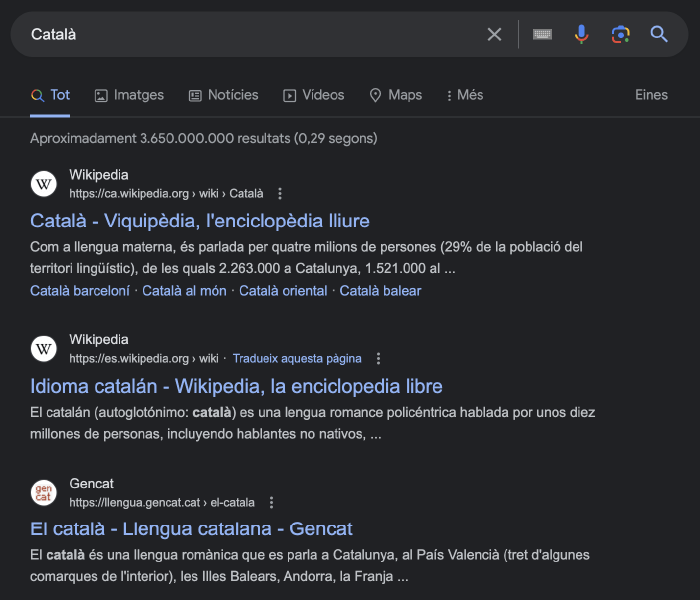In an increasingly connected world, personalization is essential in a successful digital marketing strategy. In the Spanish context, this adaptation becomes a fascinating challenge due to the existence of such distinctive regional languages as Basque, Galician and Catalan.
In this post we will tell you why it is so important to incorporate these languages in your digital campaigns. They can become the link between your brand and specific communities, creating an authentic and lasting dialogue! Make a difference in your communications by knowing the advantages of applying multilingual marketing in Spain.
Current context of regional languages
The regional languages of Spain are not only communication channels, but authentic testimonies of its identity and tradition. The various linguistic expressions throughout the country contribute to the richness and complexity of Spanish culture, especially highlighting Basque in the Basque Country, Galician in Galicia and Catalan in Catalonia.
Basque
In the Basque Country, Basque emerges as an enigma that has baffled linguists for centuries. This language does not belong to the Indo-European language family, which makes it unique. Its origin has sparked various speculations and theories.
There is research that suggests that the root of Basque comes from pre-Indo-European languages, prior to the arrival of the Celts and Iberians to the peninsula. Possible connections with Caucasian languages have also been studied. However, the exact origin of Basque remains a complete mystery.

Despite the mystery of its origin, Basque remains current in the community of the Basque Country, surviving the ups and downs of history. It is present in the daily conversations of the region, in education, in literature and popular culture. However, its use has grown only 6% in three decades of momentum.
It is precisely the low use of the language, despite its knowledge, that worries linguists.
According to surveys, more than a third of the population of the Basque Country is able to understand and speak Basque, to which is added 18% of “passive” speakers. In 75% of Basque homes, the language of coexistence is being replaced by Spanish.
Galician
It is spoken in the region of Galicia and its roots come from Latin, like other Romance languages. It also received Celtic and Germanic influences as a result of contact with the peoples who inhabited the region.
In the Middle Ages, it shared linguistic space with Latin, Leonese Romance and Castilian. However, after the union of the Catholic Monarchs, this last language became the official language and Galician suffered a decline in its written use, although not in everyday life.
Towards the 19th century, Galician experienced a literary and cultural renaissance, called “El Rexurdimento”. The publication of works in this language contributed to its revitalization and to consolidate the Galician identity. Currently, it is the co-official language in Galicia, along with Spanish. Several initiatives have been promoted to promote its use.
Catalan
It is the Romance language of Catalonia, which is also spoken in a region of France, the Valencian community in Spain, the Balearic Islands and the city of Alghero in the Italian Sardinia. It has its roots in Vulgar Latin, with Mozarabic and Germanic influences. Like the other regional languages, it was displaced by Spanish after the accession of the Catholic Monarchs to the throne.
In the 19th century and like Galician, Catalan experienced a “Renaixença” that managed to revitalize literature and position it as an essential part of Catalan identity.
Like other regional languages of Spain, Catalan was restricted during the Franco regime. However, after the end of that period it was declared the official language of Catalonia and other autonomous communities. Currently there is a significant presence of Catalan in the media, in streaming content, in education and public administration.

Use of Basque, Galician and Catalan are now official in Congress
On Tuesday, September 19, 2023, a historic day was experienced in Spain, given that the Congress of Deputies incorporated the use of co-official regional languages, simultaneously translating the plenary sessions. The Spanish government has also requested that its regional languages be included in the linguistic regime of the European Union (EU).
Basque, Galician and Catalan speakers have endured an arduous struggle to maintain the validity of their languages and with it, the culture and identity of their people. They have tried to avoid the “Castilianization” of their children in schools, since it has been identified that it is precisely young people who are most likely to abandon the generational transmission of the language, when using Spanish to insert themselves into globalized society.
Multilingual marketing in Spain is very important to encourage the use of Basque, Galician and Catalan. It promotes the creation of content aimed especially at these communities, integrates them into globalized society and contributes to keeping these languages so important for regional culture and identity current.
Advantages of using multilingual marketing in Spain
Using multilingual marketing in Spain implies many benefits for your brand, since it is a reflection of the cultural diversity of the country. Here we discuss some of the advantages to consider using Basque, Galician and Catalan in a successful campaign.
Regional reach
Applying a multilingual marketing strategy in Spain allows you to reach these communities more effectively, showing cultural sensitivity, strengthening the local connection and promoting the validity, use and transmission of these languages.
UX
By adapting your content to the language with which users feel most identified, their experience as customers improves. This leads to greater satisfaction and loyalty on the part of your consumers.
Cultural inclusion

A multilingual marketing strategy in Spain shows respect for the diverse cultural identities present in the country. This generates greater impact and resonance with local audiences.
Access to new markets
Spain is a good destination for countless international and tourism companies.
With multilingual marketing, your business can reach broader markets, attract foreign customers, and gain a place in the growing global economy.
Competitiveness
In a market as desirable as Spanish, the ability to communicate in several languages can be a great differential compared to your competition. The strategy of speaking the language of different audiences is especially relevant in the areas with the most offers, where personalization is the key to success.
Greater online visibility
Doing multilingual marketing in Spain contributes to better online visibility for your brand, particularly in a digital environment where searches in different languages are common. Optimizing content for Basque, Galician and Catalan improves positioning and increases online presence.
Development of long-term relationships
Using the appropriate language helps establish solid, long-term relationships with potential clients or partners. Effective and close communication is essential to building trust and loyalty.
You now know the reasons why doing multilingual marketing in Spain is an excellent opportunity! If you want advice on how to implement strategies of this type, at YOPPEN we have the necessary experience to help you. Contact us!




